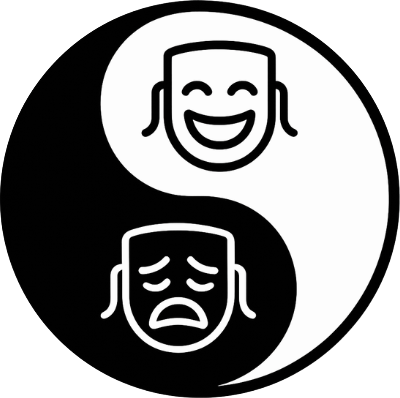Conquering Self-Tape Perfectionism
Hands up if you can relate:
You've got a cute lil' self-tape to bash out this evening. It isn't a massive task, but it's for a cool project, and you'd love to bag it. You've prepared like a BAWSE. All that's left is to get it filmed and submitted. Simples, right?

What should have been half an hour of joyous play became two hours of agonising torture – for you and whoever you roped in to read opposite. Instead of reaffirming your love for acting, the experience left you shaken, wondering whether you can even call yourself an actor. Where gratitude could have sprouted, a pit of despair festered.
If you know, you know. And what you're probably knowing is how destructive the pursuit of "perfect" can be.
There are only so many times we can run this track before we get something has to change. If we or our relationships haven't suffered already, you can bet we/they soon will.
So what's the solution? How can we enjoy and deliver excellent auditions without strangling ourselves with the chains of perfectionism?
We got 'chu.
Backed by science; built for the stage and screen.
👊 Actors:
Get evidence-informed insights and strategies to support your performance and well-being. Join the Dojo e-newsletter tribe and make thriving your reality.
🧭 Drama schools & Production companies:
Bring pioneering, research-backed coaching into your classroom or rehearsal room. Let’s talk about supporting your actors to perform at their peak – and stay well in the process.
The #truth about perfectionism
First, let's break down what perfectionism actually is.
Perfectionism is a behaviour pattern characterised by the relentless striving for unrealistic standards and basing one's self-worth on whether or not these standards are met. However, as unrealistic standards – by definition – can never be met, it follows that perfectionists never feel worthy.
As a recovering perfectionist, it took a hot second to realise that perfectionism is the least logical (or fun) game I could play. As psychiatrist David D. Burns has said, "If you are a perfectionist, you are guaranteed to be a loser in whatever you do".[1]
If that wasn't enough, psychological research has also shown that perfectionist tendencies correlate with episodes of anxiety, depression, and eating disorders.[2]
But wait... There's more!
Dr Burns points out that "Fear always lurks behind perfectionism".[3] And we don't want fear to be driving our self-tapes. As we've explored previously, fear can lead to seriousness and desperation – two amigos best left at home on audition day. Fear also reduces our ability to adapt and willingness to try something new. This rigidity prevents us from tapping into the very expressions of inspiration and courage that make art excellent – the closest any of us can get to "perfect".
Which brings us to a crucial point: high standards are one thing; perfectionism is another.
At the Dojo, we're big believers in coming to this game with high standards. A gazillion percent. But not with unrealistic standards. And certainly not to a game we've already decided we'll never win.
Aim for 80
By now, it should be pretty freaking crystal: perfectionism isn't a game any of us should volunteer to play. But what to do if we find ourselves – mid-self-tape-shoot – not only in a match but having a punch-up too?
This will sound like fingernails on a chalkboard for life-long perfectionists (hi friends 👋), but here goes: stop, drop, and aim for 80.
We know.
But look: 100% isn't even possible. Why run around chasing it? Further, assuming that we've prepared like a BAWSE for this tape (and this is key), we'll find something magical happens when we "lower our standards". To quote from Dr Burns again:
“First, you won’t be particularly successful at being ‘average’. Second, in spite of this you will receive substantial satisfaction from what you do. More than usual.”[4]
We dare you to try it.
That said, prevention is always better than cure. If we know we have ingrained perfectionist tendencies, we can put two guard rails in place at the top:
1. Create a self-tape checklist (or steal ours). Thou shalt only do what thou checklist commands thou shalt do. Not one task more.
2. Implement ye carrot or stick. Thou shalt set a self-taping time limit and stick to the self-taping time limit. If you work best with carrots, schedule something you consider a treat immediately after your time's up. If you work better with sticks, impose a (not too ruthless) penalty. Taped with your partner? Do all their housework for the next week. Taped with a friend? Buy them dinner. Taped solo? Spend an hour reading through the Dojo blog archives.
(Semi) jests aside, if the pursuit for perfection ever feels too much – too overwhelming for tactical moves like the above – please seek professional medical advice. You wouldn't be the first, and you sure as hell won't be the last.
Remember, your health and well-being always come first. If that means saying no to a self-tape, SAY NO. It doesn't matter how "once-in-a-lifetime" an opportunity might be. You are infinitely more important.
Love what you’re reading? Help us keep it flowing. Donations support the research, writing, and free sharing of evidence-informed tools for actor performance and well-being. Every dollar fuels our mission to make thriving a reality for actors everywhere 🔥
Citations:
[1] [3] [4] Feeling Good, David D. Burns
